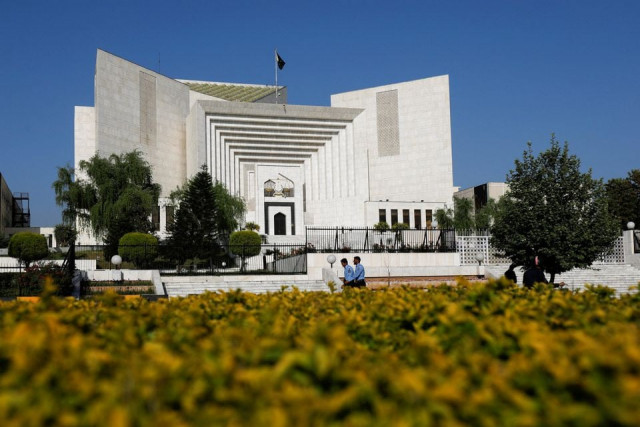‘Incomplete’ NA amended NAB laws: CJ
Justice Bandial asks whether 'truncated' NA can make amendments

Chief Justice of Pakistan Umar Ata Bandial has questioned whether or not a “truncated” National Assembly could make amendments to the National Accountability Ordinance (NAO) 2000.
A three judge-bench comprising CJP Umar Ata Bandial, Justice Ahsan, and Justice Mansoor Ali Shah heard PTI chief Imran Khan’s petition challenging the tweaks in the accountability law.
As the hearing commenced, CJP Bandial said the amendments to the NAB bill were made by an “incomplete” National Assembly and noted that there was no law specifying whether or not an incomplete assembly can legislate.
His observations came after Justice Ahsan wondered whether those who voted for the amendments were themselves beneficiaries of them.
He asked the PTI chief’s lawyer Advocate Khawaja Harris if the judiciary should intervene in the prevailing situation wherein the intent of legislatures was based on “self-interest”.
“An entire political party functions according to the directions of a few people,” he said. “Following the directions only benefits them,” he lamented. “In such a situation, should the judiciary watch the spectacle unfold with its hands and feet tied?” the judge asked.
Justice Ahsan also questioned the unholy haste while passing these amendments without any debate. He further asked about the underlying purpose of the controversial tweaks.
At this, CJP Bandial inquired if the amendments to the NAB law can be termed as “parliamentary capture.” However, PTI’s counsel told the judge that the term “parliamentary capture” was used in another sense.
Earlier, CJP Bandial also observed that despite the Supreme Court’s intervention in alleged mega scams as well as the existence of NAB for the last two decades, corruption was still persistent. He identified the executive’s failure to enact laws for ensuring transparency.
Furthermore, he admitted, the top court was also unable to give suggestions in this regard.
The CJP further said that SC gave decisions in Reko Diq as well as Pakistan Steel Mills (PSM) cases with good faith. However, the executive could not prove corruption in these matters.
The chief justice observed that it was not a matter of punishment but also of improvement of the regulatory system. A singular approach to eradicate corruption has been misused, he added.
The chief also highlighted the role of media to ensure transparency, adding that we need to protect their rights.
Upon Justice Syed Mansoor Ali Shah's query regarding the applicability of NAB law on armed forces, Khawaja Haris read out the judgement in Asfand Yar Wali’s case wherein exemption was given to serving army officials.
However, he said that under the law, serving military officers, who are working in federal and provincial government corporations, could be held accountable under the NAB law.
However, Justice Syed Mansoor Ali Shah noted that corporations such as the Army Welfare Trust, which are under the control of armed forces, are exempted from the NAB law. He wondered as to how serving military officials involved in corruption were exempted from the ambit of NAB. “Would it not be discrimination?,” he asked Imran's counsel.
However, he said that exemption was given in the Asfand Yar Wali case judgement, which was announced in 2001.
Justice Shah asked who was running the government at that time.
Meanwhile, Justice Ijazul Ahsan pointed out that there were precedents like Admiral Mansurul Haq’s case wherein military men were tried under NAB law.
It is pertinent to note here that it was witnessed that Imran Khan’s counsel was visibly reluctant to take a clear stance on the judge's query to hold the armed forces accountable under NAB law.
During the hearing, Khawaja Haris read SC judgements authored by ex-CJP Iftikhar Muhammad Chaudhry to prove how corruption is violated the fundamental rights of citizens. He said that whenever the executive remained silent, the superior judiciary intervened in matters related to corruption to safeguard the public.
Justice Shah said that no one was supporting the corruption but stressed that the issue at hand was who would address it.
The hearing of the case is adjourned until today (Wednesday).


















COMMENTS
Comments are moderated and generally will be posted if they are on-topic and not abusive.
For more information, please see our Comments FAQ